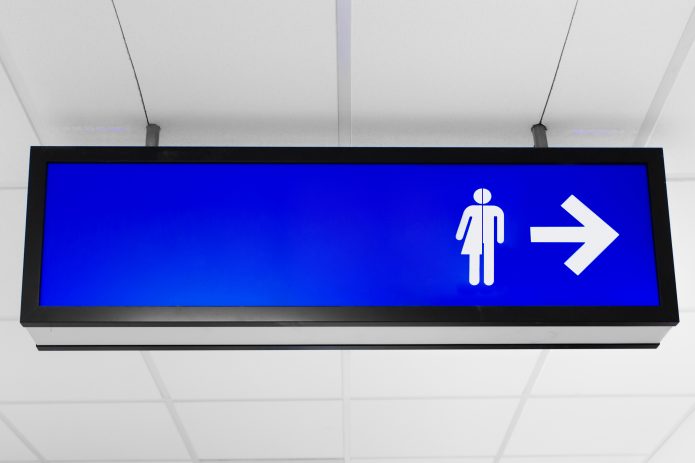 The U.S. government is officially suing the state of North Carolina over its controversial, discriminatory “bathroom bill,” which bars transgender residents from using public restrooms appropriate to their gender identity.
The U.S. government is officially suing the state of North Carolina over its controversial, discriminatory “bathroom bill,” which bars transgender residents from using public restrooms appropriate to their gender identity.
In announcing the lawsuit, U.S. Attorney General Loretta Lynch gave a powerful speech invoking the state’s segregationist past. “It was not so very long ago that states, including North Carolina, had signs above restrooms, water fountains, and on public accommodations keeping people out based upon a distinction without a difference,” she said of the South’s Jim Crow laws. “We have moved beyond those dark days, but not without pain and suffering and an ongoing fight to keep moving forward. Let us write a different story this time.”
Then, in a surprising tag-team move, the Department of Education announced an additional decree calling on public schools across the United States to allow transgender students to access restrooms and locker rooms that are consistent with their gender identities. The guidelines also advocate other ways to ensure civil rights for transgender students, such as using their chosen name and preferred pronoun and allowing them on the sports teams that match their self-identified gender. Together, these moves put public school administrators nationwide on notice: Discrimination against transgender students violates federal civil rights law.
Denying transgender students equal treatment isn’t simply discriminatory. It’s also just plain ignorant of human biology.
Those who oppose equal rights for transgender people, for instance, often insist on enforcing a linkage between gender and “biological sex.” Biology, it turns out, does indeed shape gender — just not in the way they think.
According to the National Institutes of Health, there’s no convincing evidence that gender identity is either formed independently of hormonal influences or influenced by social environment after birth. On the contrary, there’s overwhelming evidence that the behavioral expressions we identify as “gender” are formed inside the brain, in utero, as a result of the presence or lack of androgens.
This process occurs quite separately, and later in pregnancy, than the development of genitalia. Genitalia develop in the first half of pregnancy and begin producing sex hormones. In the second half of pregnancy, the brain is influenced by the varying types and amounts of hormones produced and absorbed. Thus gender variation occurs along a spectrum, to greater and lesser degrees matching the sexual organs.
It’s also distinct from sexual orientation. Someone who identifies as transgender has the same likelihood of being straight, gay or bisexual as any other person.
In short, reproductive organs themselves don’t define gender. The hormonal influence on brain structure does.
Further, Science magazine reports, more recent studies show us that most brains are “a mosaic of male and female structures.” Indeed, very few brains — researchers estimate between 0 and 8 percent — are what we’d call “all female” or “all male.” In other words, virtually none of us has a fully male or fully female brain.
Instead, we all have brains that have some degree of mismatch with the social and behavioral expectations we assign to our reproductive organs. Mismatch is the norm, not the exception.
For many of us who don’t identify as transgender, the “mismatch” may be small. For other people, it may be sufficient to warrant a change in their gender markers. Still others may feel comfortable in many gender expressions, or none at all. Many people in this category call themselves genderqueer, or trans* with an asterisk, and may include intersex people. Some may need or desire medical intervention. All need affirmative legal policies to ensure their civil and human rights.
Ultimately what’s between people’s legs tells us little about their gender. Instead, we can only know gender according to how people self-identify.
Gender, like sexuality, doesn’t exist as a binary — it exists as an arc. It’s that simple, that beautiful, and that natural. And while society catches up with science, we need legal protections to stop discrimination and violence against people who identify or present as transgender, trans*, and genderqueer. Much of this violence is perpetrated most brutally against black, as well as poor, transgender girls and women.
Bathroom bills like North Carolina’s, or laws requiring a transgender girl to be a boy in school, aren’t just ignorant of biology — they’re in opposition to what it means to be human. So rather than tell an old story of exclusion and oppression based on fictional understandings of biology — a “distinction without a difference,” as the attorney general put it — let’s stand up and tell the truth: Our gender identities belong inextricably to us.
And we all have the right to self-determination, the right to pee in peace, and the right to live free from discrimination and violence.
